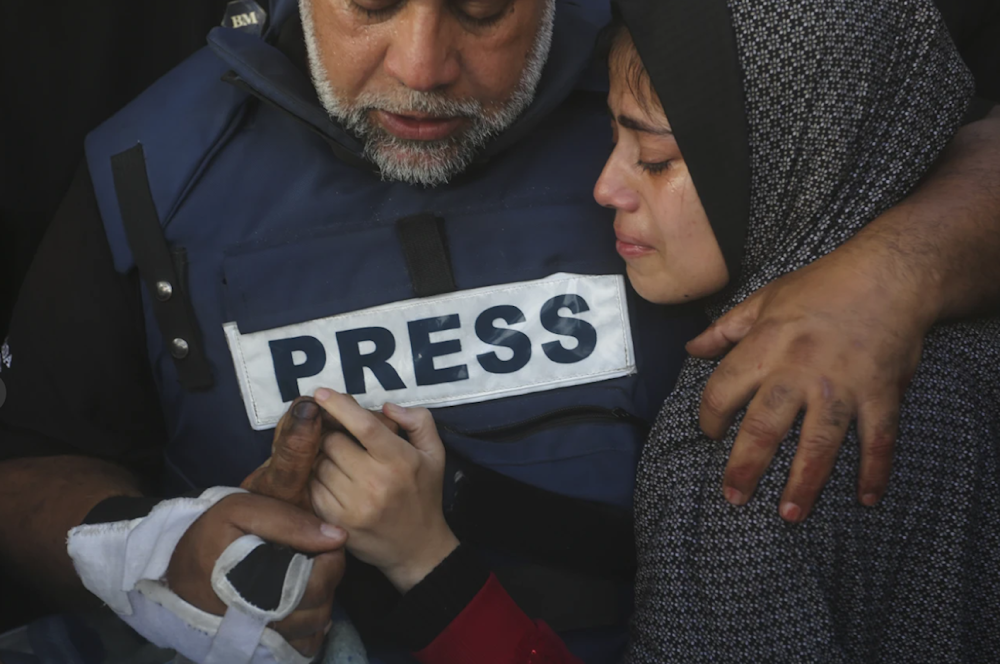Probe highlights Israeli 'attack on press freedom' in Gaza: AFP
The Israeli occupation forces (IOF) have lied about targeting journalists intentionally and have claimed that some cases mentioned in the report were militants "reported as journalists."
-

Al Jazeera journalist Wael Dahdouh holds the hand of his killed Al Jazeera journalist son Hamza, killed in an airstrike in Rafah on January 7, 2024 (AP)
A collaborative study by foreign media outlets revealed Tuesday the circumstances behind the deaths of over 100 Palestinian journalists and media workers during the war on Gaza, some of whom were wearing press vests.
Palestinian journalists have been consistently targeted, alongside their families, by Israeli occupation forces in Gaza since the genocide was launched in October. The latest death toll shows that the IOF killed 147 journalists in eight months.
The four-month investigation was headed by investigative outlet Forbidden Stories and involved about 50 journalists from 13 companies, including AFP, The Guardian, and the Arab Reporters for Investigative Journalism group (ARIJ).
Laurent Richard of Forbidden Stories wrote an editorial that accompanied the Gaza Project's release in which he reported the deaths of over 100 journalists and media workers, explaining how "Gaza journalists have long known that their 'press' vests do not protect them."
"Worse still, the protective gear might further expose them," Richard noted.
Carlos Martinez de la Serna of the Committee to Protect Journalists was shocked by the death toll, telling investigators it was one of the most "flagrant attacks on press freedom."
The Israeli occupation forces (IOF) have lied about targeting journalists intentionally and have claimed that some cases mentioned in the report were militants "reported as journalists."
Killed while wearing protective vests
The investigation discovered that four journalists were reportedly killed or injured by a drone while wearing a press vest and 14 were killed, maimed, or targeted while wearing protective press gear.
At least 40 journalists and media professionals were slain while at home in Gaza, the report said.
Basel Khair al-Din, a Palestinian journalist in Gaza who claims he was targeted by a drone attack while wearing a press vest expressed that the very vest intended to protect the press according to international law is "now a threat to us."
Between June 6 and June 16, ARIJ questioned 239 surviving journalists. The report revealed that the battle had displaced more than 200 people from their homes.
Seventy-two people reported having lost a family member. Of those, 11 said their children had been slain.
AFP and other outlets looked into a hit on its Gaza office on November 2, after its personnel had left while a live stream from a balcony camera continued.
They concluded that an Israeli tank most likely caused the strike, even though the IOF claimed it was a "shock wave or shrapnel" from another strike that damaged the bureau.
Phil Chetwynd, AFP's global news director, urged Israeli authorities to conduct a "very clear and transparent investigation" into the event," calling it "completely unacceptable" that more than 100 journalists and media workers were killed in Gaza.
Chetwynd expressed he was most worried that various governments were silent regarding the matter.
Shuruq Asad, a spokesperson for the Palestinian Journalist Syndicate (PJS), reported that more than 70 media offices had been targeted since the aggression began, also expressing surprise by the lack of international condemnation.
"I don't think this would be the reaction of the world if there was 100 Ukrainian journalists killed."
'Israel' arrested 80 Palestinian journalists from WB, Gaza since Oct 7
In early June, the Palestinian Prisoner Society revealed that 80 Palestinian journalists have been arrested by the Israeli occupation since October 7, 68 of whom were located in the West Bank, while the rest were arrested in Gaza.
The Gaza Government Media Office accused the Israeli occupation of deliberately targeting journalists to obscure the Palestinian narrative, distorting facts, and preventing journalists from documenting the crimes of the Israeli occupation forces to the public.
The International Federation of Journalists (IFJ) condemned the killing of journalists in Gaza, calling for the necessity of protecting them from the violence of the Israeli occupation forces and enabling them to perform their work.
The United Nations Educational, Scientific and Cultural Organization (UNESCO) rewarded on May 3 the 2024 UNESCO/Guillermo Cano World Press Freedom Prize to the Palestinian journalists covering the Israeli occupation's atrocities in Gaza.
"In these times of darkness and hopelessness, we wish to share a strong message of solidarity and recognition to those Palestinian journalists who are covering this crisis in such dramatic circumstances," said Mauricio Weibel, chairman of the International Jury of Media Professionals.
"As humanity, we have a huge debt to their courage and commitment to freedom of expression," he added.
The reward serves to highlight the struggle of journalists covering perilous situations and pay tribute to their courage in light of the danger they face for the sake of fulfilling their duty.

 5 Min Read
5 Min Read








